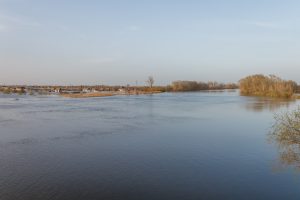For weeks, much of northern Kazakhstan has struggled in the face of devastating spring floods caused by heavy snow in the Ural mountains followed by a rapid rise in temperatures along the Russian-Kazakh border. On April 6, a dam in the Russian city of Orsk failed; on April 21 the Ural River broke its banks.
As of April 23, an estimated 120,000 people had been displaced by the various bouts of flooding that began in late March. To begin to understand the scale of the flooding, Bellingcat compiled a series of comparisons of satellite images of Kazakh towns, from Oral (Uralsk in Russian), the capital of the West Kazakhstan Region, to Petropavl, 776 miles west of Oral, to Atbasar, a town in Akmola Province that is 236 miles south of Petropavl and only 163 miles from Astana. The images show rivers sloshing far beyond their banks, the surrounding farm and pasture land inundated.
When Kazakh President Kassym-Jomart Tokayev visited Petropavl on April 16, he characterized the floods as “a disaster of a national scale.” He promised residents that “we are already taking measures to rebuild the country and deal with the aftermath of this disaster.”
And authorities across the affected regions don’t want to hear anything to the contrary.
On April 30, Kazakh journalist Raul Uporov was fined 73,840 tenge (just over $160) for “petty hooliganism” by an administrative court in Oral. Uporov told RFE/RL that he had been fined for using “obscene language addressed to the Emergency Situations Department of the West Kazakhstan Region.”
Uporov has been covering the flooding and the aftermath and in a recent Instagram stories video complained about the authorities barring journalists from accessing flood zones. On April 30, the regional emergency department announced a ban on media accessing the flooded areas “out of concern for the lives and health of journalists.”
In a comment to RFE/RL, Uporov said, “The authorities need obedient journalists who can be controlled. Journalists are no longer allowed to be present in the flood zone, and they cannot fly a drone. You can receive information only from one source — the press service of the Emergency Situations Department of the West Kazakhstan region.”
Meanwhile, almost a thousand miles away to the southwest in Kyzylorda police reportedly paid a visit to activist Gulnaz Serikbaeva to charge her with spreading false information via Facebook.
The offending post, which Serikbaeva said was based on TV and media reports, stated that in order to receive compensation for livestock lost in the floods, owners will need to produce the carcass of the animal. In a satirical nod to another piece of current news, Serikbaeva added, “If you cannot find the body, contact Bishimbayev’s fortune teller, 100% guarantee will help.”
In an April 19 report, RFE/RL’s Kazakh Service noted that “[t]here are special commissions in each region, but residents today doubt that compensation will be commensurate with the damage.” In that report, a resident of Kostanay region who said he lost hundreds of heads of livestock in the floods explained that the regional commission had told him they would only pay for those animals whose corpses could be located. “Three herds of horses, about 100 sheep, and 600 cows sailed away,” he said. “We find animal corpses and show them. Now only 50–60 percent of the corpses have been found. Half is missing. We searched for six days by boat and horseback… I don’t know where the water went between Amangeldy and Torgai, maybe it went towards Aktobe.”
The Ministry of Internal Affairs has reportedly filed 13 administrative cases and two criminal cases for dissemination of false information since the flood emergency was declared.
As the long recovery begins in the wake of receding water, Kazakh authorities are demonstrating again their deep discomfort with criticism and desire to control information. In preventing journalists from accessing flood zones, they’re denying those journalists the opportunity to illustrate what the government is actually doing to aid those affected — and, when necessary, expose failures to deliver on stated promises. The state desires to be the only source of information, which would be less of a problem if the state didn’t have a motive to gild the lily.
With stability a primary concern, and continued denial of access to opposition groups seeking to take part in the political arena, Astana has little patience for nay-sayers at every level.































